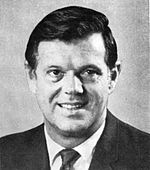Impeachment process against Richard Nixon

President Richard Nixon's farewell speech to the White House staff, delivered on the morning of August 9, 1974, after his resignation was announced but before it became effective. His departure from office was a direct consequence of the impeachment process against him.
|
|
| Date | October 30, 1973 – August 20, 1974 |
|---|---|
| Venue | O'Neill House Office Building |
| Location | Washington, D.C. |
| Cause | Watergate scandal |
| Organised by | United States House Committee on the Judiciary |
| Participants | Representative Peter W. Rodino, Lead counsel John Doar, Attorney James D. St. Clair, President Richard Nixon, many others |
| Outcome | Resignation of Richard Nixon |
| Charges | Three articles of impeachment passed |

Congressman Jerome Waldie
|
|
|
|
An impeachment process against Richard Nixon was formaly initiated on February 6, 1974, when the United States House of Representatives passed a resolution, H.Res. 803, giving its Judiciary Committee authority to investigate whether sufficient grounds existed to impeach Richard Nixon, the 37th President of the United States of high crimes and misdemeanors, primarily related to the Watergate scandal. This investigation was undertaken one year after the United States Senate established a select committee to investigate the 1972 break-in at the Democratic National Committee headquarters at the Watergate office complex in Washington, D.C. and the Nixon Administration's attempted cover-up of its involvement.
Following a subpoena from the Judiciary Committee, in April 1974 edited transcripts of many Watergate-related conversations from the Nixon White House tapes were made public by Nixon, but the committee pressed for full tapes and additional conversations. Nixon refused, but on July 24, the U.S. Supreme Court ruled against him. On July 27, 29, and 30, 1974, the Committee approved three articles of impeachment against Nixon, for obstruction of justice, abuse of power, and contempt of Congress, and reported those articles to the House of Representatives. Two other articles of impeachment were debated but not approved. Before the House could vote on the impeachment resolutions, Nixon made public one of the additional conversations, known as the "Smoking Gun Tape", which made clear his complicity in the cover-up. With his political support completely eroded, Nixon resigned from office on August 9, 1974. It is widely believed that had Nixon not resigned, his impeachment by the House and removal from office by a trial before the United States Senate would have occurred.
...
Wikipedia
